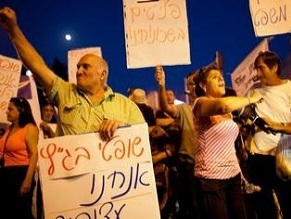|
World Jewish News

Anti-migrant protest in south Tel Aviv Photo: Tamir Kalifa
|
Protest in south Tel Aviv over High Court migrant ruling
17.09.2013, Israel Over one hundred people had gathered in the south Tel Aviv Hatikva neighborhood on Tuesday evening to demonstrate against the High Court decision that made illegal the state policy that allowed it to hold migrants for three years without trial.
The protesters were blocking traffic with signs reading “Supreme Court: we're refugees in our own neighborhoods” and “Supreme Court: we've been imprisoned without trial.”
The slogans were different, but the venue and the environment were the same as several previous protests at the site over the past couple years. That said, it was probably the most raucous one held in the neighborhood in recent memory, since a protest in May 2012 ended with Israelis running through the neighborhood vandalizing African owned stores and attacking dark-skinned people on the street.
Shaul Nissim, a life-long resident of the south Tel Aviv Hatikva neighborhood, stood in a butcher shop in the shuk and expressed what he said was the fury felt by residents in the wake of the Supreme Court decision on Monday to cancel the anti-infiltration law.
“People are going to take the law into their own hands, maybe that will bring some deterrence,” Nissim said, adding that the over 60,000 African migrants in Israel “don't care about the law at all”.
Nearby in the shuk, Tashkent native Arthur Kavodov stood behind the counter at his deli, and said of the decision “what's new? The Supreme Court has always been left wing and anti-Jewish, and this is just more of the same.”
Kavodov, a Hatikva resident who has worked at the shuk for 18 years, added “Why stop here? Why not just bring all of Africa here?”
His wife, Bella, described how she had to send one of her young daughters to a religious kindergarten, because the one in her neighborhood had become by her estimation, “at least 90% African children.”
The sentiments were familiar to anyone who's followed the African migrant issue in south Tel Aviv in recent years. Residents reactions to the ruling expressed feelings of abandonment by the state mixed with anger about a neighborhood that no longer feels like home, and whose streets no longer feel safe at night. Along the way, feelings about the neighborhood's decline was punctuated by racially-tinged language that would probably be considered offensive in polite company.
One of those present at the Tuesday night protest was Oved Hugi, a 52-year-old resident of the Yad Eliyahu neighborhood of south Tel Aviv who hours earlier caused a stir at a special Knesset committee meeting held to discuss the court ruling. Approach MK Miri Regev's seat, Hugi slammed his identity card on the desk and asked for an “infiltrator's card” saying that then he'd “have 40 NGOs looking out for me, and the Supreme Court would protect me.”
On Tuesday night, as he was being congratulated by passersby Hugi repeated his assertion that the court is detached from the people, saying “the ruling was 9-0, but you know if there was one judge who lived in south Tel Aviv it would have been 8-1, they have no idea what we're living with. I don't understand how they can be so against the people.”
A local man named Moshe put it simpler, saying “we're a masochistic country, we love to screw ourselves”.
The fury in Hatikva, which by 8:30 had not gone violent, was in marked contrast to the scene Tuesday morning in Lewinsky Park, the epicenter of Israel's African migrant population. Almost all of the migrants spoken to by the Jerusalem Post said they were not aware of any court ruling, saying that they don't follow the Israeli press. A group of Sudanese men sat at the day labor pick up site at the park, eating sunflower seeds around 10am. One man, speaking in Hebrew said he hadn't heard anyone mention a court ruling, adding that he had only heard people that morning complaining, like always, about their lack of work.
At an Eritrean-run barbershop on the Neve Shaanan pedestrian walkway, one man named David said he had also not heard about it, but added “even if these 2,000 people get out of Saharonim, if they don't have jobs, or they aren't given visas, what does it matter?”
He added that he's lived in Israel for six years without a legal work visa, and never have things been harder int eh country for African migrants like himself.
Down the street at an Eritrean-run butcher shop, two brothers worked behind the counter, one completely unaware of the court ruling, the other saying that he had heard about it from an Israeli friend. That man, a 32-year-old named Merhawi, said that they have a brother who has been in Saharonim for the past year and three months, and that when he heard the news he was pleased to hear his brother may be reunited with him in Tel Aviv soon. He then said that his brother was in jail in Eritrea for two years before leaving the country, and was then held for ransom in Sinai by human traffickers before entering Israel, where he was jailed.
When asked what his brother will do if he's released, but still has no legal status in the country or work visa, he said “he'll stay with me, he's spent enough time imprisoned.”
By BEN HARTMAN
JPost.com
|
|
